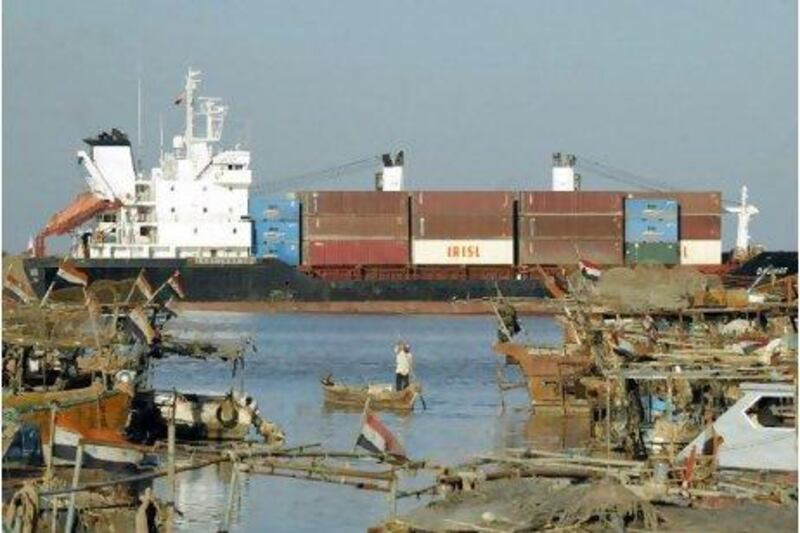BAGHDAD // A dispute over a new industrial port on the Arabian Gulf has deepened animosity between Iraq and Kuwait that dates to Saddam Hussain's invasion of the smaller country in 1991, but has in recent years become an economic issue.
For years, Baghdad has been developing plans for a new shipping centre on the Faw peninsula, near the oil-hub of Basra, as part of a multibillion dollar package designed to revitalise trade links and turn the country into an economic link between the Middle East and Europe.
Those plans are now in doubt after Kuwait began construction earlier this month on its own huge industrial port, little more than a kilometre from the site proposed by Iraq.
Kuwait has signed a deal with the Korean firm Hyundai and the port, named Mubarak, is now under construction on Boubyan Island, with completion due in 2016. It will include container docks, deeper water harbours, a free trade zone, rail network and a residential area.
In comparison, the Iraqi venture remains a series of plans, proposals and outlines, according to industry analysts.
Jassim Gharli, an Iraqi professor who heads the Gulf Studies Centre at Basra University, said: "On April 5 last year, the Iraqis planted a foundation stone for their port but absolutely nothing else has been done since then.
"They've not added so much as a piece of gravel. It has been totally neglected."
Baghdad insists it has been using the time to make necessary preparations and putting together financing for the plans, which are valued at some €4.4bn (Dh22.7bn).
It has also been courting foreign investor interest, although firms remain wary of putting large sums of money into the country.
Mr Gharli said domestic corruption and political turmoil have caused massive delays to the Iraqi project, leaving the way open for Kuwait to move forward with its own design.
"The Iraqis have been talking about doing this for several years and the Kuwaitis had stopped their plans. But all of these delays have made them decide not to wait any longer," he said.
Husain al Abadi, a former senior Iraqi ports official, said he had watched with dismay as heavy construction machinery began work on the Kuwaiti project, while nothing was happening on the Iraq side of the border.
"Iraq had the opportunity but there to is so much corruption there have been delays on top of delays," he said. "Kuwait has therefore seen the chance to step in and has taken it."
Mr Abadi said the Iraq project would not remain economically viable with a major rival so close by, with transport firms likely to ship into the Kuwait port and then move goods by rail and road into and out of Iraq.
Iraq's foundation stone was laid at the proposed site shortly after national elections held in March 2010. The inconclusive results of the vote plunged the country into a prolonged period of political stalemate as various factions jockeyed for power. For eight months, few strategic decisions were made by the Iraqi government. "We had a very good chance to use our access to the Gulf but that has been wasted," Mr al Abadi said.
Even so, Iraqi politicians and community leaders have accused Kuwait of deliberately stealing their idea in order to hamstring Iraq's economic recovery after decades of war and sanctions.
Zuhair al Araji, a parliamentarian with the Iraqiyya bloc from Basra, 550km south of Baghdad and the city that was most likely to benefit from the proposed port, said: "I'm sorry Kuwait has taken the decision to turn against Iraq. They are destroying the Iraqi economy."
Mr Araji and others said they are convinced Kuwait pushed forward on their own port as a way of punishing Iraq. Under former leader Saddam Hussein, Iraq invaded the much-smaller and less-militarised Gulf kingdom in 1990. Kuwait insists the new port is part of its own strategic plan for itself becoming a major shipping hub in the region.
Relations between Baghdad and Kuwait city have been strained, with various peaks in tension as the various claims are pushed.
Iraqi prime minister Nouri al al Maliki has now set up an emergency committee to negotiate over the port with Kuwait.
Iraqi economists have estimated the country's current deep-water port, Um Qasr, located nearby on Iraq's short coastline, will also be severely affected if a more-modern Kuwaiti competitor is built.
"We hope this issue can be dealt with properly and quickly, said Mr Araji, the Basra MP.
"The Iraqi economy is in a state of collapse and it is in everyone's interests, including Kuwait's, to fix it," he said.





